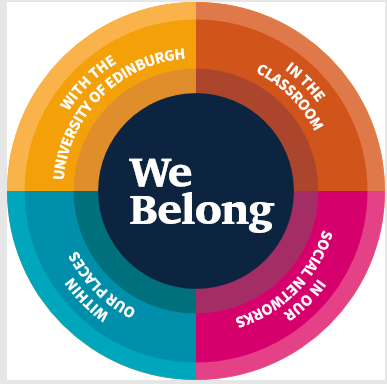
In this Embedding Belonging into the Classroom mini-series, contributors from across our university community will dive into a range of thoughts, conversations and experience on ‘embedding belonging into the classroom’. These posts will explore the various benefits of creating a sense of belonging in the classroom, challenges that prevent such feelings, examples of great work going on across the University and so much more. We hope these posts will offer new perspectives from both students and staff, but most importantly begin a larger conversation on how we can work together so University of Edinburgh students feel they belong. In this first post, Eleri Connick, Student Communities Project officer, introduces the ‘Sense of Belonging’ project…
I feel like I’m being followed by all things belonging at the moment. I was recently reading It’s not about the Burka (Khan, 2019) and this quote jumped out at me:
Belonging is like a trampoline. It is having the awareness that no matter how high you jump, there is a place down there that will absorb the force of your fall should you ever come crashing down. Belonging will propel you back up from such a fall. Higher. – Ratia Rafik.
I felt the quote resonated and captured what we are trying to achieve, and why building a stronger sense of belonging for students at university should be a priority!
But what is belonging?
Belonging is a fundamental human need, which is most simply understood as a sense of being accepted, valued, included and encouraged by others (Goodenow, 1993, 25). Research shows that a sense of belonging has particular benefits to students in its ability to do more than just validating a student’s presence on campus: It supports their wellbeing, engagement and success whilst learning (Walton and Cohen, 2011, 1447).
We want to shape the first Sense of Belonging strategy around these ideas and create a welcoming inclusive community that promotes belonging, values students and treats them with respect and empathy. The Sense of Belonging Task Group has been working at a fast pace since its formation in August 2019, including: undertaking a huge piece of qualitative research in September 2019 interviewing 38 students on their experience of belonging; piloting events like the Festive Dinners which brought 500 students who were in Edinburgh over the winter holiday together and #TeamUoE Community Running; and creating our theory of change model.
When beginning to investigate students’ sense of belonging at the University, it became very clear that the lack of belonging goes beyond any one area… Students’ sense of belonging is linked to all aspects of a student’s time at Edinburgh, from our curriculum, to estates, to our tone of voice and more.
I just honestly felt like I was completely out of my depth, I’d always been really smart in school and I was quite proud of that in myself… to be honest, looking back at it, it was quite easy, the content I was doing, but because it was taught to me in a completely different way, because I’d never sat through lectures or going to tutorials, didn’t have any idea what was going on and nobody explained it to me. No one explain this is how university works and this is how you do it…literally the only person I felt I could talk to was my own mum.
– Student Interview Participant
When a lecturer knows my name it’s very supportive. It inspires confidence in your ability to achieve more because I’m no longer one of 200. I’m an individual with my own goals. If this member of staff has given me the time of day, I must be worth enough to strive towards these things.
– Student Interview Participant
A significant element of the task group’s work will be the development and implementation of an integrated approach to all aspects of a students’ time with us, from pre-application to post graduation. The promise of a University community that is recognised by current and prospective students as a welcoming inclusive community that promotes belonging, values students and treats them with respect and empathy, rests beyond any individual School or service. It’s up to all of us – we all play a part in this community. Our theory of change model has allowed us to develop four key thematic areas to focus on:

This Mini-Series is exciting because it gives us the opportunity to hone in the importance of embedding a sense of belonging within the classroom. You could say that creating a sense of belonging in the classroom is one of the most important parts of this work because it might be the only opportunity we have to engage with our students, and give them the tools to build confidence, dismantle one’s fear of being an imposter ‘Edinburgh student’, and help them to feel that they belong. Maybe we’ve taken for granted how long it takes to build connections, and to begin to feel comfortable in one’s learning experience so not only must we make the most of every connection point that we have with our students, and we must provide our students with the tools to be confident in engaging with their peers.
For us, belonging within the classroom goes beyond just the physical classroom sense for us it means students’ sense of belonging in their wider learning experience. Therefore, over the course of the next two months of this mini-series, you’ll not only hear from students and colleagues about curricular and assessment but also about the wider things we can do in learning environments to create a sense of belonging for students from intramural sport, to White Coat ceremonies.
If you want to get involved in the conversation email we.belong@ed.ac.uk
Happy Reading!
References
Goodenow, C. (1993b) Classroom belonging among early adolescent students: Relationships to motivation and achievement. Journal of Early Adolescence. 13 (1), pp. 21–43.
Walton, G. and Cohen, G. (2011). A Brief Social-Belonging Intervention Improves Academic and Health Outcomes of Minority Students. Science, 331(6023), pp.1447-1451.


